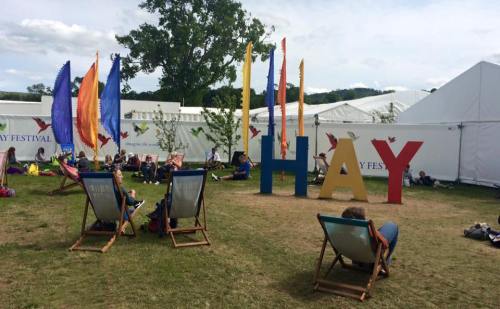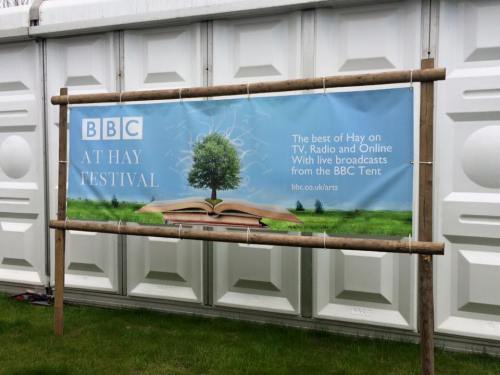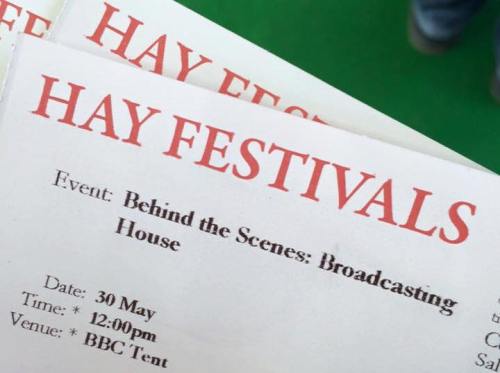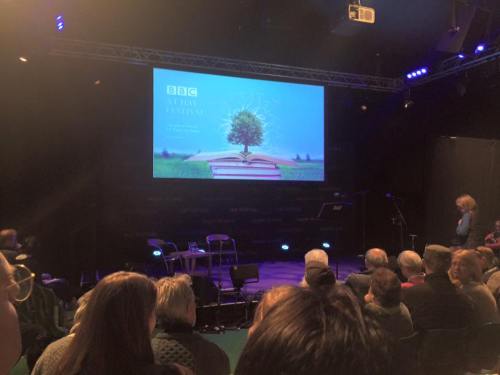Over the past week BBC ARTS has been providing extensive coverage of the Hay Festival of Literature and Arts through online live streams, social media, radio and television. But I felt that to really get a better sense of the BBC’s role as one of Hay’s largest media partners I would need to go along and experience the event first hand.
On arriving at the festival the first thing that I couldn’t fail to notice was that the BBC certainly has a very prominent presence, with large posters throughout the site advertising “The best of Hay on TV, radio and online” along with a URL for the BBC ARTS homepage.
As the epicentre for this coverage the BBC Tent predominantly hosted events and live broadcasts for Radio 3 and Radio 4, which were free to attend for the public. Each event began with the audience being shown a short video featuring vox pops from speakers such as Stephen Fry and Jude Law describing what Hay means to them, alongside clips of festival attendees sat reading in the sun or stood in queues for various talks.
However, one of the most interesting BBC events I attended in regards to my own area of research around public service broadcasting was a session by Radio 4’s Sunday morning magazine programme Broadcasting House.
Hosted by Paddy O’Connell, it offered a behind the scenes look at the inner workings of Radio 4 illustrated by O’Connell’s personal anecdotes and clips of various bloopers that had made it to air over the years.
But what was perhaps most interesting was the way in which the session was primarily focused on the views and opinions of those in the audience, with O’Connell often reiterating how important feedback from licence payers is to the BBC.
The session started with a conversational tone, inviting audience members to share their “best bits of Hay” before moving on to the slightly more provocative theme of “things you hate about BBC Radio 4”.
Along with specific programmes that prompt people to switch off, this was also met with broader concerns about the BBC being too London-centric and the recent domination of the news by the unfolding story surrounding the criminal investigations at FIFA.
In response to the last point O’Connell asked the audience which news events they would like to hear covered on future editions of Broadcasting House, going on to outline plans for features on upcoming programmes and asking for feedback on them.
There were also a few words from the editor of the programme who spoke about the difficulties of broadcasting programmes live from Hay in regard appealing to both the audience at the event and those sitting at home.
It is perhaps interesting to consider whether this is largely due to the challenges of making a radio format somewhat visually appealing for the live audience while still engaging the distant listener. Along with this, a further factor may be the differences in expectation when we listen to the radio in a domestic setting compared to the sense of spectacle that is often emphasised in live events.
From going to this event and not really knowing what to expect beyond what the title ‘Behind the Scenes’ implies, I found the emphasis on audience feedback and participation of particular interest in regard to the BBC and its public service remit more generally.
As an institution that was founded partly on the principles of providing the public with what they need rather than what they want, this shift towards public service broadcasting being presented as more user-led than paternal seems increasingly evident and indeed vital for the organisation’s continued survival. As O’Connell stated at the beginning of the session:
“When the BBC gets it right it remembers who the audience is. When it gets it wrong it forgets who the audience is”




